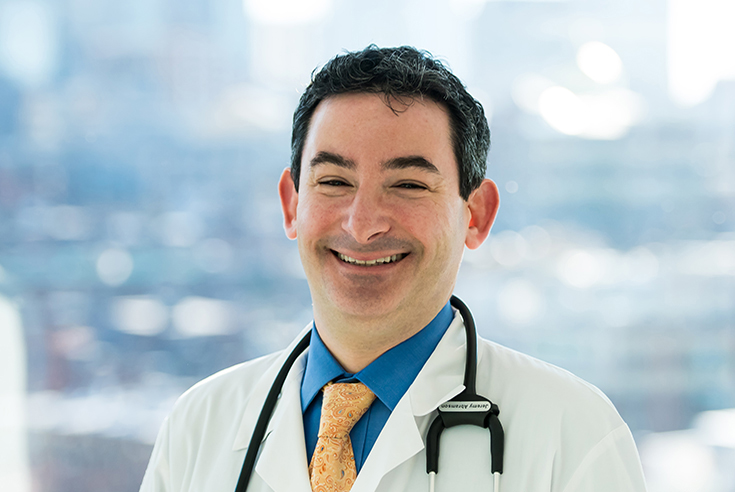CAR T-Cell Therapy Gives Hope to Some Cancer Patients With No Other Options

Jeremy Abramson, MD // Photo credit: Mass General Cancer Center
Surgery, chemotherapy, and radiation therapy have historically been the most widely used forms of treatment for cancer. Over the past several years, researchers have been learning more about the use of immunotherapy, which uses the body’s own immune system to identify and destroy cancer cells. CAR T-cell therapy, a specific type of immunotherapy, has been making headlines recently for its treatment of certain types of lymphoma.
Chimeric antigen receptor T-cell (CAR T-cell) therapy is the first immunotherapy approved by the FDA for treating some patients with advanced blood cancers – and it can save lives.
Here’s how it works: the body’s T-cells are infection fighters that latch on and attack bad cells. Blood is drawn from the patient, then the patient’s own T-cells are separated and genetically modified to contain CARs, synthetic surface receptors which target those T-cells against cancer cells. The CAR T-cells are then expanded and multiplied in the lab to create millions of them—an army of T-cells specifically engineered to attack the patient’s cancer. These CAR-T cells are then infused back into the patient where they seek out and eradicate the lymphoma cells they have been specifically trained to attack.
Recently, the FDA approved Yescarta, a CAR T-cell therapy that has shown promise for treating patients with the most common form of the aggressive non-Hodgkin lymphoma in adults: DLBCL, or diffuse large-B-cell lymphoma. This treatment has shown significant benefit in patients with relapsed DLBCL, even after standard chemotherapy has ceased to work. The Massachusetts General Hospital Cancer Center is one of the few places in the country where patients can receive this therapy.
In an August 2017 letter to the New England Journal of Medicine, a team of Mass General Cancer Center researchers reported a remarkable story of a lymphoma patient who participated in a phase one clinical trial using the treatment. They tested a CAR T-cell therapy that targets CD19, a protein expressed in most B-cell leukemias and lymphomas. The 68-year-old female patient had not responded to traditional chemotherapy and stem-cell transplant. Shortly after enrolling in the study, doctors found a new lesion in the right temporal lobe of her brain. One month later – after a single infusion of CAR T-cell therapy – the patient was in a complete remission. This was the first report of a response in the brain to CAR T-cells. Two months after the CAR T-cell therapy, a tumor recurred. Doctors performed a surgical biopsy and noticed that the CAR T-cells spontaneously re-expanded, once again putting the remaining tumor in remission.
“Brain involvement in DLBCL carries a grave prognosis, and the ability to induce a complete and durable response with conventional therapies is rare,” says Jeremy Abramson, MD, of the Mass General Cancer Center and lead author of the letter. “This spontaneous re-expansion after biopsy highlights this therapy as something entirely different, a ‘living drug’ that can re-expand and proliferate in response to biologic stimuli.”
Clinical studies have also shown CAR T-cell therapy to be particularly effective in children and young adults with acute lymphoblastic leukemia (ALL) who have relapsed. Without treatment, relapsed ALL is the leading cause of cancer death among children in the United States.
But the treatment does not come without risks.
“[This treatment] opens a whole new world of side effects that we haven’t seen before, at least to this degree.” says Dr. Matthew Frigault, an oncologist at the Massachusetts General Hospital Cancer Center.
The most severe is cytokine-release syndrome (CRS), which occurs when too many cytokines (cell-signaling molecules that affect immune responses) get into the bloodstream and cause high fevers or dramatic drops in blood pressure.
Another problem is that the CAR T-cells – in addition to fighting cancer cells – also decrease healthy B-cells that produce antibodies. In some instances, replacement antibodies then need to be infused to help fight infection.
“It is, in my opinion, a small price to pay for basically surviving and curing the lymphoma,” Dr. Frigault says.
At a cost of $373,000, the one-time treatment is more expensive than an average round of chemotherapy, but it helps those with no other options. The Mass General Cancer Center is working with payors and manufacturers to address the potential financial burden on patients and families.
Although the use of CAR T-cell therapy is still in the early stages, its use to treat cancer shows great promise. Researchers at the Mass General Cancer Center are conducting multiple studies on CAR T-cell therapy to make this treatment even better.
To learn more about the use of CAR T-cell therapy at the Mass General Cancer Center, click here.
This is a paid partnership between Mass General Cancer Center and Boston Magazine


